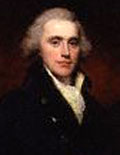A doctor's son, Addington was a young companion of William Pitt the Younger and a mediocre performer in the House of Commons to which he was elected in 1784 for Devizes (MP, 1784-1805). In 1789 Pitt secured him the Speakership of the House of Commons (8 Jun 1789 - 10 Feb 1801), an office he reformed and enhanced over a period of nearly twelve years. When Pitt resigned he supported Addington as next prime minister and the latter was appointed First Lord of the Treasury on 17 Mar 1801. Addington, claiming his ambition was peace and that peace was essential for England pleased everyone by agreeing to the Treaty of Amiens in 1802. A successful election (June 1802) followed and as his own Chancellor of the Exchequer he introduced a very effective budget in 1803. War was again declared on France on 18 May 1803 but the administration of the subsequent Military Service Act encouraging volunteers was bungled and the Administration's reputation damaged. Addington was not an inspiring performer in the House of Commons and certainly no replacement for Pitt who increasingly took up the role of Opposition. With France looking less threatening Addington's majority in the House of Commons fell away and he resigned (10 May 1804) before it disappeared. His political career continued for another thirty years, however, and he became Lord Privy Seal and then Lord President (1806-1807) under William Grenville, Lord President (1812) under Spencer Perceval, and for a long period Home Secretary (1812-1822) under Lord Liverpool. [1, pp. 83-89] |

